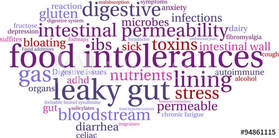
Have your allergies gotten worse over the years? Do you react to foods that you have been able to eat in the past without problems? There is a chance you have Leaky Gut Syndrome also known as intestinal permeability.
Leaky Gut Syndrome can start a cascade of problems in many other body systems. It is a condition in which the lining of the small intestine becomes damaged.
Leaky gut is caused by refined and toxic foods damaging the lining of the small intestine and breaking down its ability to filter out toxins and undigested food particles. Instead of being filtered out of the body, these irritants dump directly into the blood stream and can lead to a host of weird, vague symptoms, including:
- Food sensitivities and intolerances - not just symptoms, but actual reactions to foods - including diarrhea, bloating, nausea, allergic symptoms, and stomachaches
- Increased inflammation and all the ills it can bring: aches, pains, swelling and fever, even autoimmune diseases like RA, lupus, Hashimoto's thyroiditis, celiac, or Crohn's
- Insomnia, depression, ADD/ADHD, brain fog
- Unhealthy food cravings
- Skin problems, like rashes, acne, or dry, scaly patches
Some undetected symptoms drive people to seek medical care. The problem is, apart from indicators like positive allergy tests or blood work that's off, there's no particular diagnostic for leaky gut. Symptoms can wax and wane depending on the foods being consumed, and most people do not keep an ongoing food or symptom diary. Leaky gut can cause a lot of problems for sufferers and their medical providers.
The medical profession recognizes the basic mechanism of leaky gut, but because there's no specific diagnostic or treatment they can recommend, they don't have tests or treatment for the root cause of all the problems, only for the various results listed above. Some experts recommend supplements to help heal leaky gut, but one thing that's easy and safe is to eat clean. If you've given up crazy New Year resolution diets, now's the time to try a simpler plan and make "clean eating" a daily habit.
Not only can you lose weight, but eating right - eating "clean" - can actually heal your body if you suffer from leaky gut.
What does eating clean mean in the leaky gut world? Essentially, it's avoiding the foods that commonly cause insult to the small intestine. The easiest thing to do - and it's not really easy if you're addicted to these foods! - is to cut out certain foods for a few weeks and see how you respond. If you start feeling better, you know that some of the foods you've eliminated are causing problems. Once you have eliminated a food or several foods for a few weeks, gradually re-introduce one food at a time. Journal any reactions, such as digestive issues, joint pain, excess mucus or skin irritations. Some foods may cause reactions so gradual that you may not notice. The more faithful you can be to the elimination diet, the less inflamed your body will be, and the faster your leaky gut will heal.
Foods to consider eliminating:
- Dairy
- Soy
- Refined sugar
- Alcohol
- Caffeine
- Wheat/ gluten
- Corn
You can try adding some foods known to be helpful to the gut as well as the rest of your body, including:
- Healthy fats like those found in fish and certain plant oils (coconut, flax, avocado);
- Probiotic supplements to help improve your gut flora, now known to have a huge impact on health and weight. If you don't like taking supplements- kimchi, saurkraut, coconut kefir and other fermented foods are rich in healthy bacteria, which will help your gut and your overall health;
- Foods high in fiber to keep your digestive tract moving;
- Nut or seed milk (almond milk, cashew mild, hemp milk, etc) in place of cow's milk;
- Anti-inflammatory herbs and foods, like turmeric, ginger, nuts, beans, and colorful vegetables (orange and dark green especially).

 RSS Feed
RSS Feed
